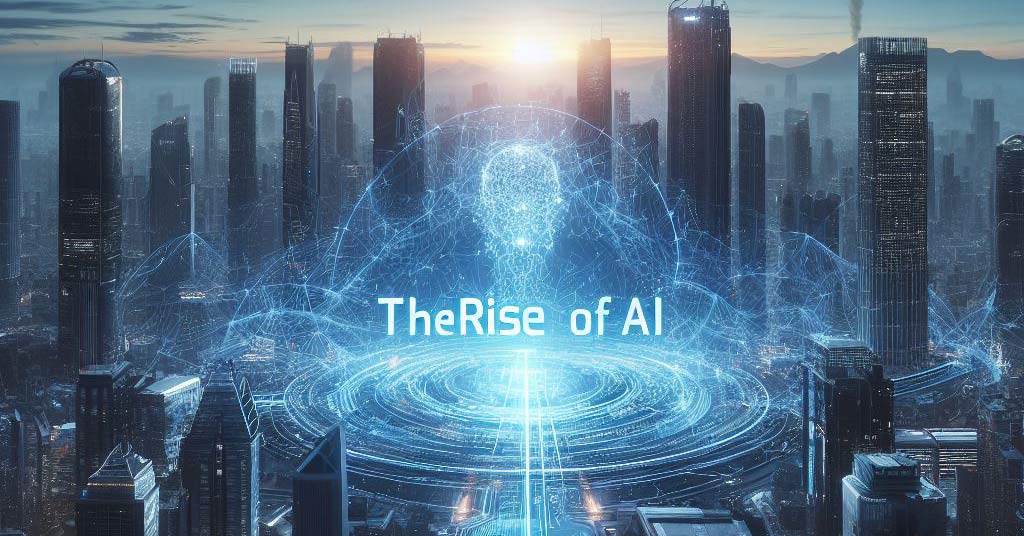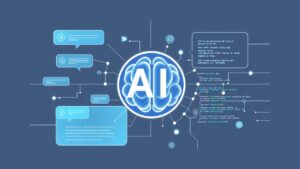What is AI and Why is it Important?
Artificial intelligence, or AI, is the field of computer science that deals with creating machines or software that can perform tasks that normally require human intelligence, such as reasoning, learning, decision making, or natural language processing. AI has been advancing rapidly in recent years, thanks to the availability of large amounts of data, powerful computing resources, and innovative algorithms. AI has many applications and benefits for various domains, such as education, health, business, entertainment, and security. However, AI also poses some challenges and risks, such as ethical, social, legal, and economic issues, that need to be addressed by researchers, policymakers, and society.
In this article, I will discuss some of the factors that have contributed to the rise of AI, some of the achievements and impacts of AI, and some of the future directions and implications of AI. I will also provide some examples and references to help you understand the concepts and issues related to AI.
How Big Data Powers AI Systems
One of the main factors that have enabled the rise of AI is the availability of large amounts of data, or big data, that can be used to train and test AI systems. Data is the fuel of AI, as it provides the information and knowledge that AI systems need to learn from and perform tasks. This Data can come from various sources, such as sensors, cameras, social media, online platforms, or databases, and can be structured, unstructured, or semi-structured. Data can also be labeled, which means that it has some annotations or descriptions that indicate what it represents, or unlabeled, which means that it does not have any annotations or descriptions. Labeled data is useful for supervised learning, which is a type of machine learning that involves learning from data that has some desired outputs or outcomes. Unlabeled data is useful for unsupervised learning, which is a type of machine learning that involves learning from data that does not have any desired outputs or outcomes, but rather finding patterns or structures in the data.
How Computing Resources Enable and Enhance AI Systems
Another factor that has facilitated the rise of AI is the development of powerful computing resources, such as hardware, software, and cloud services, that can process and store large amounts of data and run complex algorithms. Hardware refers to the physical devices and components that are used to perform computations, such as processors, memory, storage, or graphics cards. Software refers to the programs and applications that are used to create and execute algorithms, such as programming languages, frameworks, libraries, or tools. Cloud services refer to the online platforms and resources that are provided by third-party providers, such as Microsoft Azure, Google Cloud, or Amazon Web Services, that allow users to access and use computing resources over the internet, without having to own or manage them. Computing resources are essential for AI, as they enable the implementation and deployment of AI systems. Computing resources can also be distributed, which means that they can be shared and coordinated among multiple devices or locations, or parallel, which means that they can perform multiple tasks or operations at the same time. Distributed and parallel computing can improve the efficiency and scalability of AI systems.
How Algorithms Define and Achieve AI Goals
A third factor that has influenced the rise of AI is the invention of innovative algorithms, or methods, that can solve problems and perform tasks using data and computing resources. Algorithms are the core of AI, as they define the logic and rules that AI systems follow to achieve their goals. Algorithms can be based on different paradigms or approaches, such as logic, search, optimization, or machine learning. Logic is a way of representing and reasoning about facts and rules using symbols and formal languages, such as propositional logic, predicate logic, or fuzzy logic. Search is a way of finding solutions or answers to problems or questions using strategies and heuristics, such as breadth-first search, depth-first search, or A* search. Optimization is a way of finding the best or optimal solution or answer to a problem or question using criteria and constraints, such as linear programming, integer programming, or genetic algorithms. Machine learning is a way of learning from data and experience using models and functions, such as regression, classification, clustering, or neural networks.
How AI Impacts and Benefits Various Domains and Tasks
AI has achieved many remarkable results and impacts in various domains and tasks, such as:
- Education: AI can enhance the quality and accessibility of education by providing personalized and adaptive learning, intelligent tutoring, feedback, assessment, and guidance to students and teachers. AI can also facilitate the creation and delivery of educational content, such as courses, textbooks, videos, or games, using natural language processing, computer vision, or speech recognition. AI can also support the development and evaluation of educational policies and practices, such as curriculum design, pedagogy, or accreditation, using data analysis, simulation, or decision support.
- Health: AI can improve the prevention and diagnosis of diseases, the treatment and management of patients, and the discovery and development of drugs and vaccines, using techniques such as medical imaging, electronic health records, wearable devices, or bioinformatics. AI can also assist the training and education of health professionals, the coordination and communication of health services, and the regulation and governance of health systems, using methods such as virtual reality, telemedicine, or blockchain.
- Business: AI can increase the productivity and profitability of businesses by automating and optimizing processes, such as manufacturing, supply chain, marketing, or accounting, using robotics, sensors, or operations research. AI can also enhance the innovation and competitiveness of businesses by creating and delivering new products, services, or solutions, such as e-commerce, entertainment, or finance, using natural language generation, computer graphics, or recommender systems. AI can also support the decision making and strategy of businesses by providing insights and predictions, such as customer behavior, market trends, or risk analysis, using data mining, machine learning, or artificial neural networks.
- Entertainment: AI can create and generate new forms of entertainment, such as music, art, literature, or games, using techniques such as generative adversarial networks, style transfer, or procedural content generation. AI can also enhance and personalize the experience and enjoyment of entertainment, such as movies, television, or social media, using methods such as computer animation, face recognition, or sentiment analysis. AI can also facilitate the interaction and collaboration of entertainment, such as online communities, virtual worlds, or esports, using technologies such as chatbots, avatars, or voice synthesis.
- Security: AI can protect and defend against threats and attacks, such as cybercrime, terrorism, or warfare, using tools such as encryption, authentication, or surveillance. AI can also detect and respond to incidents and emergencies, such as accidents, disasters, or pandemics, using systems such as anomaly detection, disaster management, or contact tracing. AI can also prevent and mitigate the impact and damage of security issues, such as fraud, corruption, or violence, using solutions such as biometrics, forensics, or crime prevention.
Challenges and Risks of AI: Ethical, Social, Legal, and Economic Aspects
AI has also some challenges and risks that need to be addressed and managed, such as:
- Ethical: AI can raise ethical questions and dilemmas, such as the responsibility and accountability of AI systems and their creators, the fairness and transparency of AI systems and their decisions, the privacy and security of AI systems and their data, and the values and principles that AI systems and their users should follow. Ethical issues can affect the trust and acceptance of AI systems by society, and the impact and consequences of AI systems on society. Ethical issues can also vary depending on the context and culture of AI systems and their users. Ethical issues can be addressed and managed by developing and applying ethical frameworks and guidelines, such as the Asilomar AI Principles, the IEEE Ethical Guidelines for AI, or the EU Ethics Guidelines for Trustworthy AI.
- Social: AI can have social implications and effects, such as the impact and influence of AI systems on human behavior, emotions, relationships, and communication, the role and function of AI systems in human society, culture, and institutions, and the interaction and collaboration of AI systems and humans, or AI systems and other AI systems. Social issues can affect the well-being and happiness of humans and AI systems, and the harmony and diversity of human and AI society. Social issues can also depend on the type and level of AI systems, such as narrow AI, general AI, or super AI. Social issues can be addressed and managed by conducting and applying social research and studies, such as the Human-AI Interaction, the AI and Society, or the AI and Social Good.
- Legal: AI can pose legal challenges and problems, such as the legal status and rights of AI systems and their users, the legal liability and regulation of AI systems and their creators, the legal enforcement and compliance of AI systems and their actions, and the legal harmonization and coordination of AI systems and their laws. Legal issues can affect the justice and order of AI systems and society, and the protection and empowerment of AI systems and humans. Legal issues can also differ depending on the jurisdiction and legislation of AI systems and their users. Legal issues can be addressed and managed by developing and applying legal frameworks and rules, such as the AI and Law, the AI and Policy, or the AI and Governance.
- Economic: AI can have economic impacts and consequences, such as the creation and destruction of jobs and industries, the distribution and allocation of resources and wealth, the growth and development of markets and economies, and the innovation and competitiveness of products and services. Economic issues can affect the prosperity and sustainability of AI systems and society, and the opportunity and equality of AI systems and humans. Economic issues can also vary depending on the scale and scope of AI systems and their users. Economic issues can be addressed and managed by developing and applying economic frameworks and models, such as the AI and Economy, the AI and Business, or the AI and Innovation.
Artificial intelligence is a rapidly evolving field that has the potential to transform our world in many ways. AI can provide us with new opportunities and solutions for various problems and tasks, such as disease diagnosis, personalized learning, product innovation, and entertainment creation. However, AI also poses some risks and challenges that need to be carefully considered and handled, such as ethical dilemmas, social impacts, legal uncertainties, and economic inequalities. Therefore, it is important to understand the implications and limitations of AI, and to ensure that it is used and governed in a responsible and beneficial manner for humanity and society.




